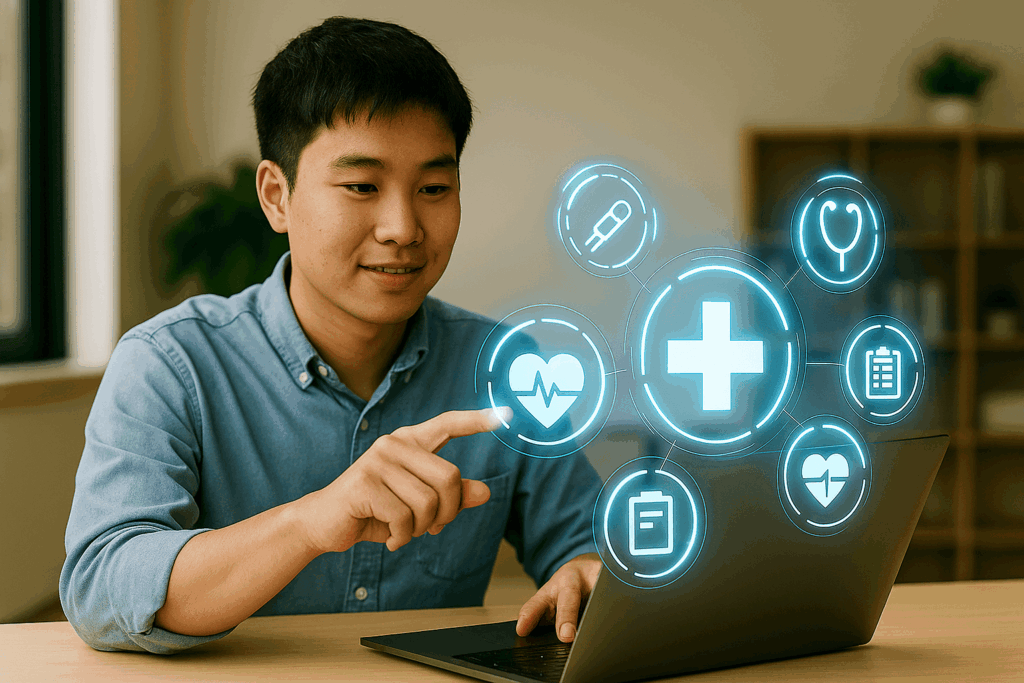As healthcare becomes increasingly reliant on technology and data, health informatics plays a vital role in shaping how information is used to support patient care.
If you’re interested in combining medicine, technology, and data to improve health outcomes, this article will guide you through what health informatics is, how it’s applied, and how you can build a career in this evolving field.
LIMITED BURSARY (2025):
Thinking of starting a career in medical informatics? Study at RCSI & UCD Malaysia Campus (RUMC), a globally recognised medical school backed by 400 years of Irish medical education excellence.
- RM45,000 special bursary available
- Students pay only RM1,970 per year
- PTPTN-supported with global career pathways
Secure your future in the fast-growing digital healthcare sector. Apply now while the bursary is still available.
What is health informatics?
Health informatics is a multidisciplinary field that blends healthcare, information technology, and data science to improve how medical information is collected, shared, and used. From electronic health records to AI-assisted diagnostics, health informatics is reshaping patient care, streamlining workflows, and driving innovation in modern healthcare systems.
Key Aspects of Health Informatics
Health informatics encompasses several primary areas of focus that form the foundation of the field. These key aspects ensure the success of health informatics in improving healthcare outcomes:
- Information Management: The practice of acquiring, storing, organising, and protecting both digital and traditional medical data.
- Data Analytics: Applying data science techniques to identify trends, predict outcomes, and improve healthcare processes.
- Interoperability: Ensuring that different health information systems, devices, and applications can exchange and use data seamlessly.
- System Design and Implementation: Developing and maintaining effective electronic health records, databases, and networks to support healthcare operations.
- Information Security: Implementing measures to protect sensitive health data from breaches and ensure patient privacy.
- Decision Support: Creating tools and systems that help clinicians make informed decisions based on real-time, data-driven insights.
- Process Improvement: Streamlining healthcare workflows and administrative processes to enhance quality, safety, and efficiency.
- AI and Machine Learning: Using advanced technologies to improve diagnosis, treatment planning, and predictive analytics in healthcare.
- Education and Training: Ensuring healthcare professionals are equipped with the necessary knowledge and skills to use informatics tools effectively.
Applications of Health Informatics
Health informatics is transforming the healthcare landscape through practical, day-to-day applications that directly impact patient care, healthcare management, and medical research:
- Remote Patient Monitoring (RPM): RPM allows healthcare providers to monitor patients’ health data in real-time, enabling timely interventions.
- Computerised Physician Order Entry (CPOE): CPOE systems enable physicians to enter medication orders electronically, reducing errors associated with handwritten prescriptions.
- Artificial Intelligence in Diagnostics: AI is being used to analyse medical scans like MRIs and CTs with increased speed and accuracy. Health informatics supports this by ensuring that diagnostic data is collected, structured, and integrated into clinical systems where AI tools can be applied effectively
Sub-Specialities and Career Paths in Health Informatics
Health informatics offers a wide range of sub-specialities and career opportunities across various healthcare sectors.
Clinical Informatics
Clinical informatics focuses on bridging clinical practice and digital systems. Specialists in this area work alongside healthcare providers to implement and improve technologies like electronic health records and clinical decision support tools. Their role ensures that digital solutions align with real-world patient care.
Bioinformatics
Bioinformatics applies informatics to the analysis of biological and genomic data. It plays a key role in fields such as personalised medicine, drug discovery, and genetic research. Bioinformaticians often work with large-scale datasets to uncover insights that can inform diagnostics and treatment strategies.
Health Information Management
Health information management (HIM) centres on the governance, accuracy, and security of health records. Unlike data analytics or system design, HIM professionals focus on compliance, coding standards, data quality, and ensuring that medical information is accessible and well-managed across healthcare institutions.
How to Get Started in Health Informatics

To get started in health informatics, begin with a background in healthcare, IT, or a related science field. Many professionals enter the field through a bachelor’s degree in health informatics, computer science, biomedical science, or public health. From there, gaining hands-on experience with electronic health records, health data systems, or clinical IT tools is crucial. Internships, certifications, or postgraduate study can further deepen your expertise.
1. Choose the right education pathway
Start by enrolling in a relevant programme such as health informatics, biomedical science, computer science, or public health. Some institutions also offer dedicated degrees in health informatics. For school leavers, science-focused foundation programmes can provide an excellent starting point.
2. Gain practical experience in healthcare settings
Look for internships or entry-level roles in hospitals, clinics, or health tech organisations. Working with electronic health records, clinical databases, or digital systems helps build familiarity with real-world applications of health informatics.
3. Build essential technical and soft skills
Develop core competencies such as data analysis, database management, and understanding medical terminology. At the same time, strengthen your communication and critical thinking skills—these are vital when working with both technical teams and healthcare professionals.
4. Consider professional certifications or further study
If you already have a background in science or IT, a certification in health informatics or digital health can help you pivot into the field. Postgraduate programmes are ideal for those aiming to specialise or move into leadership roles.
5. Stay updated with trends in digital health
Health informatics is constantly evolving. Stay informed through industry webinars, short courses, research journals, or events covering AI, data security, telemedicine, and healthcare innovation.
Begin your Health Informatics Career with RUMC
Health informatics offers a dynamic and rewarding career path, with opportunities across clinical care, public health, research, and healthcare management. As technology continues to transform healthcare, the demand for skilled health informatics professionals will only increase, making this an exciting field for future innovators and problem-solvers.
Join RUMC, a medical school with over 400 years of excellence in medical education and a reputation for shaping future leaders in healthcare.
Ready to take the next step? Explore RUMC’s medical informatics degree today.





